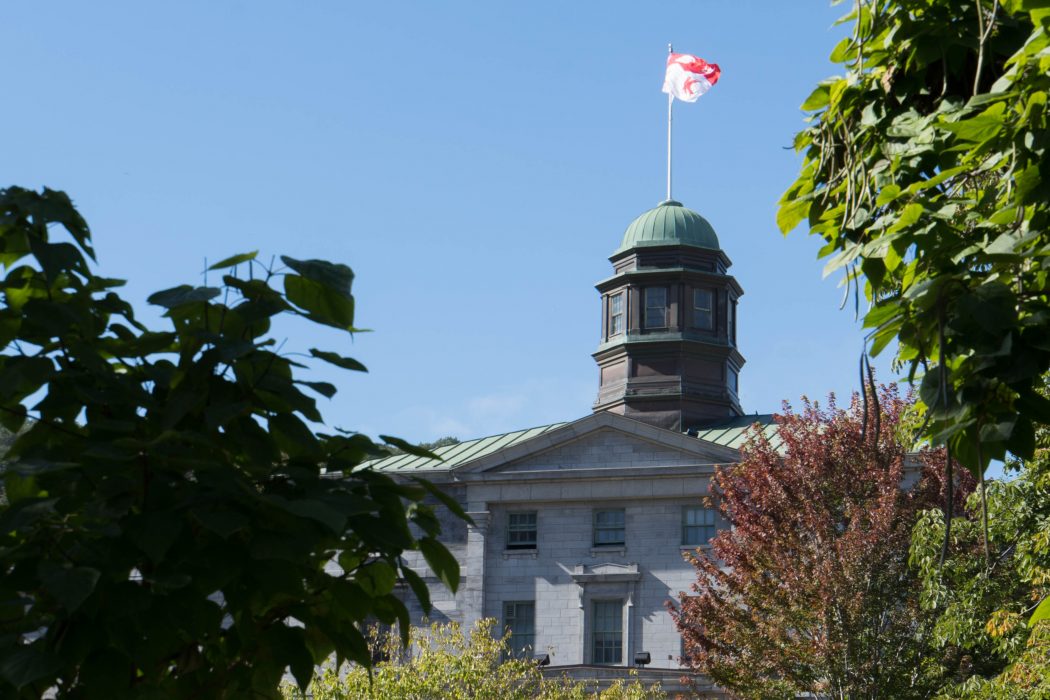On May 11, 2020, McGill announced that the Fall semester would be delivered primarily using remote platforms due to COVID-19. The Bull & Bear spoke to first year students about their varied experiences of the semester so far as the Add-Drop period comes to a close.
Over the past months the Canadian government has placed many restrictions on international travel, making it especially difficult for international students from McGill to come or return to the University for the semester. The Canadian government has encouraged international students to stay in their country of residence for the term, and only students with essential reasons for return will be allowed through the border.
Elena Meyer, a first year Arts international student, decided not to travel to Montréal for the Fall 2020 term in light of the pandemic and travel restrictions.
“I heard so many stories about first years getting turned away at immigration,” Meyer said, “I did not want to risk it and thus decided to do my first semester in Milan and not Montreal.”
Starting a semester online is stressful for many but starting university online can be even more daunting. Picking your classes and organizing your schedule alone and remotely is made even harder for new students, especially as some will spend their semester in another time zone.
Meyer indicated that although she was starting university remotely, she felt supported by the academic team at McGill and was not too anxious about her academics. With courses being delivered online, Meyer says she feels more independent and responsible, and that there are some advantages with online classes that in person learning cannot offer.
“McGill has a lot of resources for new students starting remotely like me,” Meyer said. “I like that with remote teaching you can organise your schedule the way you want to. A positive aspect of online courses for students is that instead of being in a classroom of 600 students, you are alone in front of your computer and you can focus better.”
Along with academic learning, social life will be more restricted this term. New students will be limited mostly to on-screen interactions until January and meeting fellow students will be complicated.
“You don’t picture university to be from home, because the university experience is not just about classes and academics – it’s about meeting new people,” Meyer said. “Being an international student, almost all my friends left Milan to go study in other places, and I feel like I’m missing out [on] the start of university experience.”
International students are not the only first year students sharing concerns for this upcoming semester. Canadian students in residences are also having doubts about their academic and social experiences during this pandemic, as Quinnland Guest, Arts U0 Canadian student, explained.
“I still don’t know how I am feeling about online school,” Guest said. “Academically, classes might be harder to engage with which makes it harder to learn. In the past I have done online summer school and I found it much more challenging to stay on top of my work, so I am focusing on my time management this semester.”
Classes might be harder to engage with which makes it harder to learn.
For this semester, only modern dormitory style residences, also called hotel-style residences, are open (RVC, Carrefour Sherbrooke, New Residence Hall, La Citadelle) and are at 50 per cent capacity, according to Fabrice Labeau, Deputy Provost (Student Life & Learning). As for students inside the residences, Labeau said that protocols have been enacted in order to keep students safe.
The goal is to “try and minimise the possibility of transmission on campus,” said Labeau. Students have to respect a two-meter safety distance and wear face coverings in shared indoor spaces, following the recommendations of the Canadian Government. “We have specific rooms reserved for individuals if they are tested positive,” added Labeau, indicating that residences that are currently open have strict rules to limit the reach of COVID for McGill first year students.
Guest, who will live in RVC this year, also shared that in residence, the social life has been altered by the pandemic.
“Though it hasn’t been impossible to meet people now, we as students have to keep our safety in the back of our minds and have to be careful about how many people we are seeing at one time,” Guest said.
For new students in Montreal, Frosh had to adapt to the pandemic as well, with events being hosted online instead of all over the city
“Last year, I would watch all of the Frosh videos, which got my expectations really high for Frosh,” Guest said. “Online Frosh could never live up to those expectations but my Frosh leader did a really good job to keep the conversation entertaining.”
Online Frosh could never live up to [my] expectations.
Students were put into different Frosh Groups, but according to Meyer, students mostly felt like they were watching a YouTube video despite the best efforts of Frosh Leaders.
“The result of Frosh sadly did not reach the expectations the students had,” admitted Meyer.
However, new students have been adapting to the social situation as best as they can via social media platforms around the world. For instance, a lot of McGill students staying in Paris for the Fall term have private group chats to allow future students to meet, despite the pandemic cancelling traditional events. McGill residences have also tried to facilitate social exchanges for incoming students via social media.
“There are group chats for every residence,” Meyer described. “I was surprised how ongoing and inclusive and united everyone was. There is always someone to help, always someone to talk to.”
This semester is going to be an unusual one for all, especially for first years whether they decided to stay home or move to residence in Montreal. As Guest indicated, “both academic and social life is going to be different from normal, and both will probably take a little more effort this year.”








